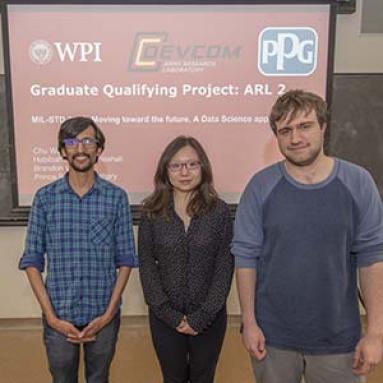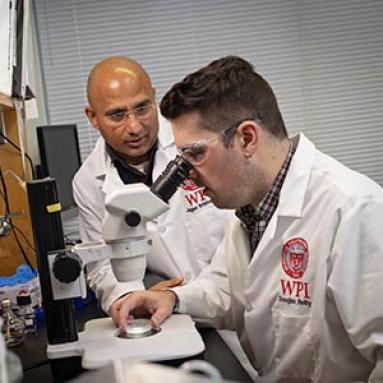School of Arts & Sciences







Imagine. Innovate. Integrate. Impact.
The School of Arts & Sciences touches every aspect of work at WPI. Woven throughout our disciplines, the seamless interactions between and among the arts and sciences—as well as engineering and business—allows sparks of imagination to come to life through scientific, technological, artistic, and humanistic innovation.
The arts and sciences do not just overcome barriers between disciplines but eliminate them such that the possibilities are limitless. Guided by three concepts—Imagine, Innovate, Impact—our students and faculty work together on projects and in classrooms and labs with the dedicated commitment to promote discovery and communication, advance knowledge, and improve the human condition.
This is a place where music, art, and design thinking allow our scientists and engineers to have long-lasting impact, inspiring and exciting the imagination to reach their own stars, regardless of what they choose to research or study.
Arts & Sciences in Action
The 2021 WPI Concert Band’s Virtual Exhibition, APART, is an engaging and creative presentation including aerial drone footage of the campus during the last piece. Performance order: Percy Grainger’s "Shepherd’s Hey", David Biedenbender’s "Melodious Thunk" and Rossano Galante’s "Journey Through the Stratosphere."
Meet Our Students

Rebecca Moody
See what the professor of teaching, arts & sciences keeps in her office.

Crossing Fronteras
The LACS podcast series – Crossing Fronteras – focuses on contemporary scholarship and art in Latin American and Caribbean Studies. It broadcasts interviews with scholars and creatives from institutions around New England working on the region
The Call of Karen Comedy Simulation Game
For the four members of Team Trumbus, the Major Qualifying Project (MQP) marked their professional beginnings and brought home the reality of how good teamwork makes a difference. Their MQP produced The Call of Karen, a PC comedy simulation game released in July and now owned by more than 100,000 players around the world.

Translating Science into Art
Dmitry Korkin, professor of computer science, and a team of graduate students used molecular modeling to reconstruct the 3D structure of major viral proteins and their interactions with human proteins. This remarkable work was published in Viruses, a leading virology journal. A stunning glass sculpture of the coronavirus particle by Scottish artist Angela Palmer, based on Korkin’s model, is on display at the UK’s Oxford University Museum of Natural History.

Manasi Vartak '10
Manasi Vartak '10 founded Verta to help companies build AI-enabled products faster than ever.
More from WPI's University Magazine

Music and Science in Harmony
For Sergio Salvatore ’02, coding is just a form of composing.

Building Consensus in the Midst of Crisis
Julie Cerqueira ’02 brings the urgent call for clean energy to the international community
Announcements
See More AnnouncementsMedia Coverage
See More Media CoverageMedia Coverage
See More Media CoverageFour Schools. One WPI.








